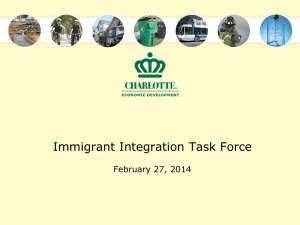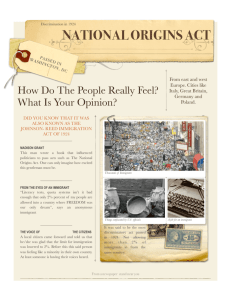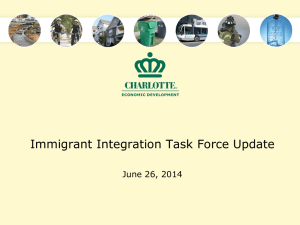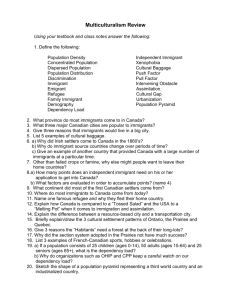Immigrant Integration Task Force Meeting
advertisement
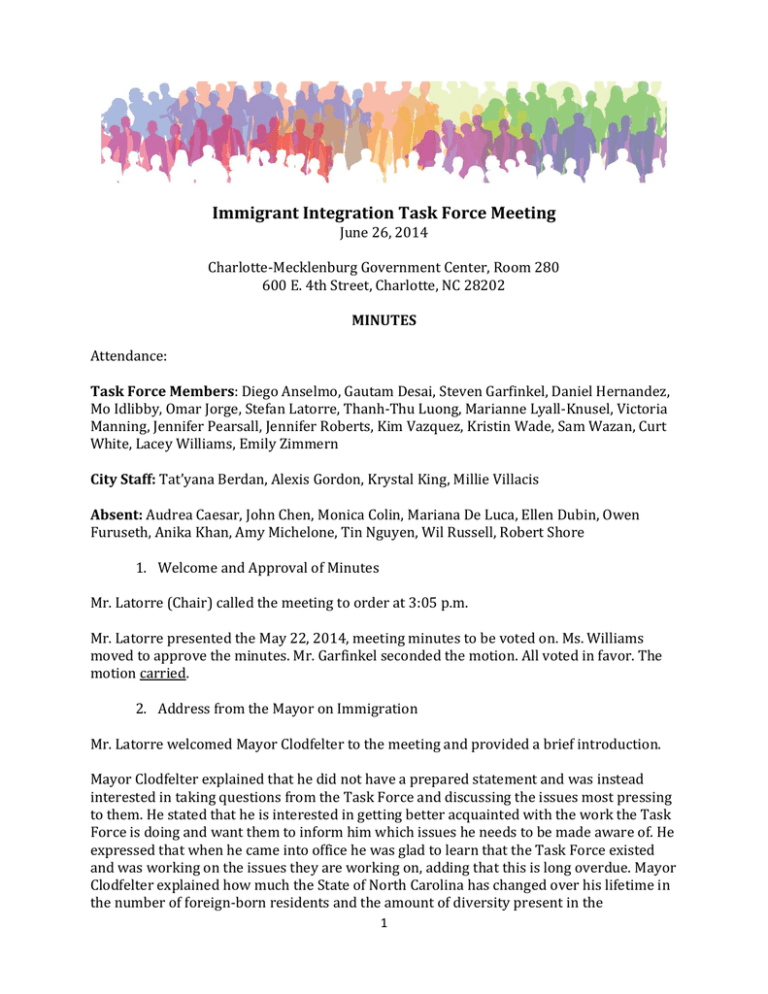
Immigrant Integration Task Force Meeting June 26, 2014 Charlotte-Mecklenburg Government Center, Room 280 600 E. 4th Street, Charlotte, NC 28202 MINUTES Attendance: Task Force Members: Diego Anselmo, Gautam Desai, Steven Garfinkel, Daniel Hernandez, Mo Idlibby, Omar Jorge, Stefan Latorre, Thanh-Thu Luong, Marianne Lyall-Knusel, Victoria Manning, Jennifer Pearsall, Jennifer Roberts, Kim Vazquez, Kristin Wade, Sam Wazan, Curt White, Lacey Williams, Emily Zimmern City Staff: Tat’yana Berdan, Alexis Gordon, Krystal King, Millie Villacis Absent: Audrea Caesar, John Chen, Monica Colin, Mariana De Luca, Ellen Dubin, Owen Furuseth, Anika Khan, Amy Michelone, Tin Nguyen, Wil Russell, Robert Shore 1. Welcome and Approval of Minutes Mr. Latorre (Chair) called the meeting to order at 3:05 p.m. Mr. Latorre presented the May 22, 2014, meeting minutes to be voted on. Ms. Williams moved to approve the minutes. Mr. Garfinkel seconded the motion. All voted in favor. The motion carried. 2. Address from the Mayor on Immigration Mr. Latorre welcomed Mayor Clodfelter to the meeting and provided a brief introduction. Mayor Clodfelter explained that he did not have a prepared statement and was instead interested in taking questions from the Task Force and discussing the issues most pressing to them. He stated that he is interested in getting better acquainted with the work the Task Force is doing and want them to inform him which issues he needs to be made aware of. He expressed that when he came into office he was glad to learn that the Task Force existed and was working on the issues they are working on, adding that this is long overdue. Mayor Clodfelter explained how much the State of North Carolina has changed over his lifetime in the number of foreign-born residents and the amount of diversity present in the 1 community. He urged the Task Force to tell him what issues he should be thinking about in order to better serve the Task Force. a. Municipal ID Mr. Latorre explained to the Mayor that the Task Force has been conducting Community Listening Sessions throughout Charlotte in an effort to hear directly from immigrants about the issues that are important to them. One issue that is consistently mentioned at these listening sessions is the need for a form of identification. He explained that the lack of a legal form of ID was creating many problems for immigrants in the city, including making purchases at stores, particularly prescriptions; visiting their children at school; and dealing with the police. Mr. Latorre informed the Mayor and the Task Force that he had conducted personal research into ID laws in other cities, which have proven successful, and believes this is a project that Charlotte could and should take on. Mayor Clodfelter thanked Mr. Latorre for bringing up the ID issue, adding that it is relevant in additional contexts, including with regard to the new voter identification law in North Carolina. There are many people in the community who do not have identification for voting purposes and he has been thinking about the value of a local identification option because it can be used by many people for many different purposes. Mayor Clodfelter explained that his office had just finished conducting some research into what other cities are doing with regard to this issue and expressed interest in receiving a copy of the research Mr. Latorre had conducted. The Mayor also met with the superintendent of Charlotte Mecklenburg Schools after the issue came up at a meeting he spoke at in May to better understand the issue as it pertains to the school system. The Mayor, the City Manager, and the superintendent have had preliminary conversations about the creation of a CMS Task Force to look into the issue more closely. He wanted to make sure that efforts are not being duplicated and that he remains informed about the work that the Immigrant Integration Task Force is doing. Ms. Williams pointed out that Charlotte has an advantage over other cities because the Charlotte-Mecklenburg Police Department (CMPD) is supportive of a municipal ID. In other cities, such as San Francisco and New York City, the police have hindered progress on the issue. She has had conversations with Charlotte’s Chief of Police and explained that sometimes the police cannot even identify victims of crimes because they do not have an ID. Mayor Clodfelter stressed the importance of bring the County into the conversation and making sure that there is a partnership among the three units of local government (City, County, and CMS) in whatever is developed. It is also important to emphasize that the issue of identification is not just an issue for the immigrant community, but is essential for all segments of the community. Ms. Roberts voiced some concerns that she sees with regard to the municipal ID. One is that for the voter ID law, there is a specific list of what will be accepted as a legal form of ID, so this list would have to be amended in order to include whatever Charlotte creates. The 2 Mayor commented that the city could also create an ID that fits into one of the alreadyapproved categories. A second concern was the fact that several local initiatives have been stymied at the state level, and Ms. Roberts asked if there were any pathways Charlotte could take to avoid this with the municipal ID issue. Mayor Clodfelter responded that it will be important to make sure the proposal has strong support at the local level – from the City, County, police, school system, and community – before taking it to the State level and stressed doing as much research into the issue as possible to garner the support needed. Mr. Latorre mentioned that many of the cities that have implemented an ID have partnered with local businesses and other agencies to add value and interest in the ID for all residents, not just immigrants. Mayor Clodfelter said a local ID could also serve as identification for banking and financial transaction purposes. Ms. Williams brought up the DC One Card as a good example of a multifunctional municipal ID, which is used to track children using after- school programs as well as serving as a library and metro card b. Other Issues Although the lack of a municipal ID is a major issue, Ms. Zimmern (Vice Chair) explained that the immigrant community had a number of other critical needs as well (See Appendix A for PowerPoint presentation). One consistent comment from the immigrant community has been the need for a central location to access resources and information about services available. However, she emphasized that this would only be effective if it was a coordinated effort among all branches of local government. Mayor Clodfelter said he was particularly interested in the notaries public vs. notaries at law issue because he had been involved with legislation several years ago that the Senate believed had solved the confusion between the two. Mr. Latorre explained that the issue had not been resolved and that people continue to practice without a license and give legal advice when they are not a lawyer. Ms. Wade suggested that it may be an issue of enforcement. Mr. Latorre explained that the amount of evidence a person would have to produce to bring a case against one of these notaries at law is prohibitive, and most of the time it is immigrants who are being taken advantage of, and they are not as willing to come forward. Mr. Wazan pointed out that part of the problem may also have to do with a lack of awareness in the immigrant community. Mr. Desai mentioned that two other issues brought up at the listening sessions included public transportation and a lack of outreach and communication between the government and the immigrant community. He suggested there may be a need to review how the transportation services are utilized in order to provide more customized services to where immigrants live and work, which are often in outlying areas and are not currently serviced well. With regard to outreach, he suggested that the city utilize small businesses, restaurants, and faith based groups throughout Charlotte as information outlets and stressed the importance of seeking out leaders in the immigrant communities. He explained that there are still fears and misconceptions within some immigrant communities about the government and that many people do not understand the difference between political, civic, nonprofit and other organizations. 3 Mr. Anselmo returned the discussion to the municipal ID issue. As a Major with the CMPD, he explained that a municipal ID would allow officers to issue people driving without a license a citation instead of arresting them. He explained that, even if the police stop someone for a minor infraction, they have no choice but to arrest the person if they are unable to identify them. Once this happens, the 287(g) program kicks in, which results in the deportation process. Mayor Clodfelter pointed out that the Task Force needed to be conscious of the fact that mandatory ID programs tend to produce fear and that the city would need to make it clear this would be an optional program. Mr. Anselmo mentioned that in Guadalupe, Mexico, voter ID cards are more important than driver’s licenses – businesses accept them as legal forms of identification more than the driver’s license and there is a culture of understanding of how important this ID card is. Mayor Clodfelter pointed out that, in North Carolina, the largest groups without an ID for voting purposes tend to be the elderly and students. Mr. Anselmo also remarked that a municipal ID would help the CMPD better enforce curfews for teenagers. Mayor Clodfelter thanked the Task Force for the work they are currently doing and are going to do, and urged them to call on his office when they need support. He is looking forward to the Task Force’s recommendations and again requested to be sent any research that has already been conducted on the municipal ID issue. 3. Where We Are Today Ms. Zimmern drew the Task Force’s attention to the presentation slide outlining the Community Listening Sessions already held and which organizations had been contacted and were considering holding a listening session. She emphasized that there is still a need to hear from certain immigrant groups, mainly the South Asians, who make up the second largest immigrant group in Charlotte, and the Europeans. Mr. Garfinkel again offered to reach out to the European business groups that he is involved with, but he expressed concern that there would not be much interest in participating. Ms. Roberts pointed out that these communities still face certain issues like recognition of advanced degrees and certifications and visas, and that even though these might be statelevel issues, they are still issues the Task Force can advocate for. She offered to reach out to Sven Gerzer of the Charlotte Chamber of Commerce. Mr. Desai remarked that, with regard to certain communities, especially the Indian and European communities, the semantics or terminology used might impact the interest elicited. He pointed out that the word “immigrant” has a negative connotation among certain groups, especially with the European community whose members consider themselves expatriates. Customizing the messaging to specific communities could help garner more interest, as well as reaching out to major international businesses in the area or international business schools such as the Darla Moore School of Business. 4 As far as reaching out to the Indian and Pakistani communities, Mr. Desai believes it is a matter of outreach. He said early September would be the perfect time to make contact with these communities because of the large Indian festival that takes place in the city around that time. He said he would get back to the Task Force with contact information for prominent leaders in these communities. Ms. Lyall-Knusel stated that CPCC has a relationship with the German Consulate and suggested reaching out to them about hosting a listening session. Ms. Zimmern explained that the Task Force will make the effort to reach out to as many groups as possible and will then focus its recommendations on where there is the greatest need and where real actions need to be taken. Ms. Zimmern then reviewed the major points gathered from the listening sessions that had taken place so far. She explained that each listening session has produced extensive notes, the data from which will be synthesized and provided to the various sub-committees that will be formed at either the July or August meeting. With regard to what is being done well in Charlotte to help immigrants, in addition to the feedback outlined in the presentation, Ms. Zimmern noted that, in general, the immigrant community feels that the broader community is welcoming and supportive and that the free health clinics are much appreciated. With regard to what can be improved in Charlotte to help immigrants, she added that safety, especially for women, on public transportation and confusion about or not understanding job application processes, particularly for people with limited language competency or limited access to a computer to apply online, seemed to be prevalent issues. With regard to critical needs in Charlotte to help immigrants, one additional response has been the need to build trust between immigrants and the government and immigrants and the general public. Another point of concern deals with media messaging and how, when talking about newcomers, too much focus is on the negative and not enough focus is on the positive. Mr. White pointed out that, from what he has observed, many of the things immigrants credit the city with doing well are actually not city programs but services provided by different non-profit and community groups in the area. He said that because these groups are such an important resource for and already have the trust of immigrant communities, it is vital that the city does more to support these organizations. Ms. Roberts mentioned an idea that came up at one of the listening sessions, which was to create a “navigator” or mentor program to pair newcomers with a community member or family to help them navigate their new city. Ms. Zimmern said that, in her opinion, the most critical issue was the lack of a central point for resources: the immigrant community wants to participate but does not know how to do so. She also believes many immigrants do not feel empowered to voice their concerns because they do not trust the government or the police. 5 Mr. Wazan replied that, drawing on his own experiences as an immigrant, he believes immigrants need to be more inspired to integrate faster and participate in their new communities, as most have a tendency to want to stay isolated. Mr. Jorge said he believes the most effective way to reach the immigrant community is through small businesses such as restaurants, grocery stores, and other businesses, because even if a person isolates themselves from the community, they still participate in the local economy. The point is to go where they are to get the word out. Ms. Williams said that based on her work with immigrants, she believes most genuinely want to integrate and participate in society, but no pathways exist to make that possible. Ms. Zimmern agreed and pointed out that many participants at the listening sessions seemed to genuinely appreciate that the city wanted to hear their concerns. The challenge now is to do something with the feedback the Task Force is receiving. Mr. Desai mentioned that housing conditions and code enforcement were two other major concerns being expressed at the listening sessions. Mr. White informed the Task Force about the listening session conducted the night before with the Mountcrest Tenants United group. He explained that the city has been hearing a lot of allegations of discrimination by building managers and owners towards residents, particularly immigrants. The group submitted a petition to the city, which requires Code Enforcement to inspect every unit at the Mountcrest apartment complex. Code Enforcement regularly hears allegations that there is discrimination by management towards immigrants who live in a complex and frequently partners with the Community Relations Committee to investigate these complaints. Because Code Enforcement is strictly concerned with the physical building structures and cannot get involved in the process between the landlord and tenant, it is important to get partners involved, including possibly the Greater Charlotte Apartment Association. Mr. Latorre asked about the response time for housing complaints. Mr. White explained that when a complaint is received, the city has to respond to the tenant within three business days. If code inspectors find what they term “dangerous violations,” such as missing smoke detectors and carbon monoxide monitors or incorrect electrical wiring, the management is required to fix these items within 48 hours. Violations that are not a danger to a tenant are required to be fixed within 60 days. He explained, however, that many times the tenants do not understand that it will take time for certain issues to be fixed. Also, many times, the tenants are often already in the process of being evicted and there is a misconception that if they call Code Enforcement the eviction process will be halted. Whenever Code Enforcement receives complaints about discrimination, they partner with the Community Relations Committee (CRC), who responds within one to two days. Ms. Williams pointed out that sometimes tenants who speak out about poor housing conditions or discrimination face retaliation from management, such as not having their leases renewed. Ms. King informed the Task Force that Lezlie Briggs, a Community Relations Specialist who does outreach and education for the fair housing department, had attended a listening session in which the participants had had several major issues with housing discrimination and had not been aware there are resources the city provides to assist them with these issues. Ms. Briggs introduced herself to the Task Force and 6 explained that retaliation from building management against tenants is considered a form of discrimination. She said that cases typically take about 60 days to resolve, and that during this process the CRC attempts to come to a resolution with the landlord. If the case extends beyond 100 days, it will usually end in a court case. Ms. Briggs informed the Task Force that the CRC recently received a grant to investigate fair housing in the international community. She encouraged members to spread the word and contact the CRC with any complaints. Mr. Desai pointed out that certain international communities are so difficult to reach and do not actively engage in the community because self-reliance is a big part of their culture. He said many do not expect certain services to be available, especially from the government. Mr. Desai also explained that in many communities there is a lack of interaction between new and old immigrants, so community leaders often do not have connections to the entire community. Therefore it will be important for the city to constantly be looking for potential new leadership in the community. Ms. Gordon responded that this disconnect was the reason the Task Force decided to extend the listening session period past July in hopes of reaching as many small grassroots organizations as possible. She said the smaller listening sessions, hosted by groups that work directly with immigrants and have their trust, have yielded some of the best results. 4. Survey Ms. Zimmern transitioned the meeting to discuss the community survey. She directed the members’ attention to the handout containing a draft of the survey questions (see Appendix B). Ms. Gordon explained she grouped the questions by topic, which would make it easier for data collection purposes. She is going to be working with a city staff member who regularly develops surveys to reword the Task Force survey; she will need the Task Force’s input on the survey content. Ms. Gordon then informed the Task Force about the pilot survey that had been conducted at Carnaval Carolina on June 15, 2014. About 50 people completed the survey, most of whom were from Mexico. One lesson learned from this survey was that for the questions requiring a written response, most of the people left them blank or only wrote a one-word answer. For this reason, it will be more useful to have multiple choice questions instead of open-ended questions on the Task Force survey. She also said the pilot survey had included several questions how people are employed, but the data gathered from these questions does not provide information to help the Task Force learn what actions need to be taken. Mr. Latorre informed the Task Force that they would soon break into small groups to review the possible survey questions and discuss any changes they feel should be made. One suggestion Ms. Gordon offered was to remove the demographic questions to make space for other questions. Many Task Force members felt that it was important to keep the demographic questions because it would help them identify if there are certain problems prevalent in particular groups. 7 Ms. Zimmern asked the Task Force to let Ms. Gordon know if any of them were interested in working with her on developing the phone survey. She explained that several local newspapers had offered to print the survey in an effort to help distribute it and Action NC had expressed interest in having volunteers from their organization go out into the community to conduct the surveys. 5. Sharing the Nashville Experience Before breaking into small groups to discuss the survey, Mr. Latorre and Ms. Gordon discussed their recent trip to Nashville for a conference with the Americas Society/Council of the Americas. The conference brought together government officials, the private sector, and community leaders to discuss immigrant integration on a local, state, and federal level. He explained that Nashville began shifting its focus towards aiding their immigrant community after a coalition defeated an “English-Only” bill. The success of this coalition started a pro-immigrant movement that has allowed Nashville to make significant strides in being recognized as a welcoming city. Mr. Latorre talked about Nashville’s Casa Azafrán, which is a community center that serves as a one-stop-shop for the immigrant and non-immigrant community alike. The center houses several nonprofit organizations, healthcare services, ESL classes, and a kitchen for food truck owners to use. There are also plans to start a preschool there. He explained that while Tennessee is a fairly conservative state, its state representatives have been increasingly supportive of immigrant reform and have tackled issues like higher education for foreign-born residents. Mr. Latorre said that he believes Charlotte could implement some of the same strategies Nashville has to help its immigrant population. Ms. Gordon added that a major theme of the trip was creating a space for the community, the city, and other partners to come together and work for the benefit of all. She said the key to Nashville’s success is that they have managed to avoid turf wars and ownership issues among different non-profits and community groups in favor of working together to benefit the greater good. She also explained that the community leaders in Nashville have been able to get so much done because they have taken initiative and have been determined not to wait around for the state or federal government to undertake immigrant reform issues. Ms. Gordon said that a Louisiana council member at the conference had expressed hope that the southeast could become a leader in immigrant integration and be known as a region that embraces equality and diversity. 6. Group Discussion Mr. Latorre invited the Task Force members to break into small groups to discuss the Mayor’s presentation and the survey questions. Once the groups came back together, Mr. Latorre proposed creating a subcommittee to work on finalizing the survey. The Task Force members who volunteered to serve on the 8 subcommittee were Mr. Latorre, Ms. Wade, Mr. Desai, and Ms. Lyall-Knusel, and they agreed to meet at Mr. Latorre’s office on July 2, 2014, at 10:00 a.m. Ms. Gordon announced that next Task Force meeting was scheduled for July 24, 2014, and reminded the Task Force that there is still time to hold listening sessions. She encouraged them to attend the sessions and help lead the discussions or take notes. The meeting was adjured at 5:09 p.m. 9 Appendix A: June 26, 2014, Immigrant Integration Task Force Meeting PowerPoint Presentation 10 Immigrant Integration Task Force Update June 26, 2014 Immigrant Integration Task Force Mayor Clodfelter Address on Immigration Immigrant Integration Task Force Reflection • Break into groups of six • 3 minutes to individually answer the 2 questions on the sheet titled “Reflections on Today’s Presentation” • 10 minutes to discuss your answers among your group • Share what topic generated the most interest in each group Immigrant Integration Task Force Already Held Organizations Largest Populations contacted/considering: Meck. County: • Action NC • • Charlotte Chamber/LACC/CMBCC Southeast Asian Coalition • Vietnamese American Senior Association • Refugee Support Services • CIC/Choice Translating • IITF at Bethesda Center • Latin American Coalition • Muslim American Society • CPCC/ Neighborhood Good Samaritan Center • CMS • International house after meet and greet (7/19) • Asian Library • CAACC • Neighborhood Good Samaritan Center • Community Relations Committee • Mecklenburg Ministries • • • • Latin America o Mexico o El Salvador o Honduras Asia o India o Vietnam o China Europe o United Kingdom o Germany Africa o Nigeria o Liberia o Ethiopia Immigrant Integration Task Force What Are We Doing Well? • Cultural events and festivals showcase diversity • There are a variety of nonprofit organizations to assist immigrants • There are good public transportation options and routes available • There are more job opportunities available • Schools offer quality English Language classes • Entrepreneurship is encouraged • The community is accepting of international business community Immigrant Integration Task Force Where can we improve? • Better information to CMS students and parents – How to navigate education system – How to become involved in schools • Improve access to information about resources – Marketing efforts need to be improved – Information needs to be printed in multiple languages • We need more culturally competent services • We need more sidewalks • We should streamline the process to open new businesses – Less paper work – Clarify/Simplify regulations Immigrant Integration Task Force What are some critical needs? • Driver’s license/ID access • Central location for resources – An official “Welcome to Charlotte” directory or orientation – Not just an online presence Address roadblocks caused by the 287(g) program • – Limits economic opportunities • Cultural sensitivity training for police, other City/County service providers • Increased access to start-up capital and loans • Address notary public versus notaries-at-law issues Immigrant Integration Task Force Next Steps Next Meeting • June 26, 3:00-5:00 p.m. CMGC, Room 267 Next Listening Session • June 11, 11:00 a.m.-12:30 p.m. Neighborhood Good Samaritan Center More Information • www.CharlotteInternational.org Appendix B: Possible Survey Questions Employment: • What’s your job situation? • What type of organization do you work for? • How much education do you have? • Is your education recognized by your employer? Language: • What languages do you speak well? Civic and Political Participation • In this country, are you part of a political party or group? Trade union? Immigrant or other organization? • Do you know an association run by immigrants? • Have you heard of the immigrant consultative body? • Does the region need more elected officials with an immigrant background and why? Long Term Residency • Have you ever applied for long term residence? • Do you want to become a long-term resident? Why not? Citizenship • Do you want to become a citizen? Why not? • Have you ever applied to become a citizen? Age: Gender: Country of birth: Year moved to US: First US city you lived in: Year move to Charlotte: What brought you to Charlotte: Job School Family Other How welcoming is Charlotte? 1= very unwelcoming 7=Very welcoming How would you rate the quality of your housing? 1= very low quality 7=Very high quality How would you rate the price of your housing? 1 = too expensive What are some POSTITIVE things you tell people from outside the United States about Charlotte, NC? 19 What are some NEGATIVE things you tell people from outside the United States about Charlotte, NC? Highest Level of Education Completed: High School Some College Associate’s Degree Bachelor’s Degree Master’s Degree Doctorate Professional Degree Is your degree from another country? Is it recognized in the US? If not, what is your highest level of education recognized in the US? Have you interacted with any of the following non-profit organizations? (Maybe change to open ended) How can Charlotte be a more “international” city? How can Charlotte be a more “welcoming” city? What do you believe the City of Charlotte needs to focus more efforts on to better serve all its citizens (for example, transportation, public safety, environment, taxes and services, etc.)? What is the best way to communicate with the population your organization serves [for example, church bulletins, the internet, local media (TV, radio, newspaper? which stations/publications?), flyers at the library, social media, etc.]? What can you, as an immigrant community, do to facilitate integration? What will you do, differently, to promote communal citizenship? What programs, ways, or means do you believe will provide you with a home-town climate? How do you see your community (of immigrants) in two, five, and ten years? What are the obstacles that you face in pursuing what you initially thought will be the American dream? What cultural values do you hold on to and are passing to future generations in your family and community? What cultural values do you retain and would like to mold into your way of life here in Charlotte? What problems are you experiencing that you otherwise wouldn’t have in your country of origin? Where do you go for help to address or resolve these problems…in question 8? Since you immigrated, what is/was the most powerful enabler of your success? Since you immigrated, what is/was the most debilitating factor that stood in your way of success? 20
